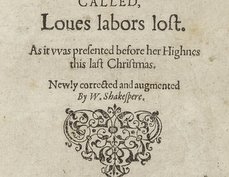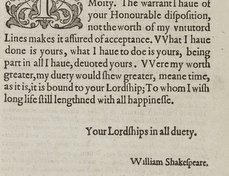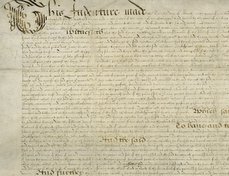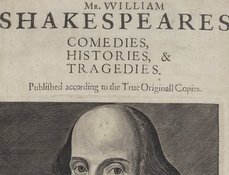Reproduced by permission of Shakespeare Birthplace Trust
Terms of use
The Shakespeare Birthplace Trust has graciously contributed images under a Creative Commons Attribution NonCommerical ShareAlike 4.0 International license. Visitors may download, link to and cite the images for personal research only. Any further use, including, but not limited to, unauthorized downloading or distribution of the images, commercial or third party use, is strictly prohibited. Visitors must contact the Shakespeare Birthplace Trust to request additional use, at: images.scla@shakespeare.org.uk
Document-specific information
Date: ca. late 1610 - early 1611
Repository: The Shakespeare Birthplace Trust, Stratford-upon-Avon, UK
Call number and opening: BRU15/2/11, fols. 1-7
View online bibliographic record
Robert Bearman, "William Shakespeare joins Richard Lane and Thomas Greene in a suit against George Baron Carew, Sir Edward Conway, and others concerning the annual payment of a rent to Henry Barker for leasehold interests in parts of the Stratford tithes," Shakespeare Documented, https://doi.org/10.37078/495.
Shakespeare Birthplace Trust, BRU15/2/11. See Shakespeare Documented, https://doi.org/10.37078/495.
This document is a draft of a bill of complaint to be submitted to the Court of Chancery regarding annuity payments on property relating to the 1544 lease of the Stratford tithes. An answer by one of the defendants confirms that the bill was indeed filed, although no record of the action survives in the court’s archives. This draft throws valuable light on the complicated history of the Stratford tithes while also demonstrating Shakespeare’s willingness to become involved in legal proceedings to safeguard his income.
Richard Lane and Shakespeare, two of the plaintiffs, begin their case by reciting various deeds and transactions reaching back to 1544, when the tithes of the whole parish of Stratford, then held by the Collegiate Church of Holy Trinity, had been leased to one William Barker for 92 years, together with most of the other College estate. The plaintiffs continue by explaining that Barker’s descendants assigned this lease to John Hubaud in 1580, in return for an annuity of £27 13s. 4d. and that Hubaud’s will split the part of the lease affecting the tithes of Old Stratford, Welcombe and Bishopton between two beneficiaries. William Shakespeare’s purchase in 1605 of one of these half-shares carried with it the obligation to pay £5 annually to John Barker as his contribution to the annuity of £27 13s. 4d. His fellow complainant, Richard Lane, with an interest in the Shottery and Clopton tithes, was also contributing to Baker’s annual payment, although the exact amount is not specified in this draft. (To learn more about the history of the Stratford tithes, please refer to Ralph Hubaud’s 1605 assignment of a lease of a share in the Stratford Tithes to William Shakespeare.)
Lane’s and Shakespeare’s central complaint is that many others who held interests in the former College property (principally portions of the tithes but everyone else is carefully listed) were not paying their share of the Barker annuity. By 1610, this had resulted in the Barkers pressing Shakespeare and Lane and “some fewe others” (unspecified) to pay the full sum and threatening them with dispossession if they refused. The complainants therefore petitioned that those not making a contribution (specifically naming George Lord Carew and Sir Edward Conway as holders of the tithes of Bridgetown and Luddington respectively) be required to make an appearance in Chancery to answer the complaint and show why steps should not be taken to establish a fair contribution for them to make.
The third complainant was Thomas Greene, the attorney and town steward, who, as shown here, made several alterations to the draft in his characteristic hand. He was in the process of purchasing a reversionary interest in the lease of the other half of the tithes of Old Stratford, Bishopton and Welcombe, to come into effect once a sub-lease to the Combe family, for 21 years from 1595, had expired. Perhaps Greene was concerned to establish the precise sum that he would be expected to pay towards the Barker annuity. Alternatively, as Shakespeare’s tenant or lodger at around that time, personal considerations might also have played a part.
Although the draft is undated, the answer by one of the defendants, bearing annotations dated February 13 and 18, 1611, is unlikely to have been submitted more than a month or two after the complaint was filed. Greene had not begun negotiations for the purchase of his share of the tithes until September 1609, but an earlier limiting date cannot be precisely identified.
Written by Robert Bearman
Last updated July 11, 2020




























